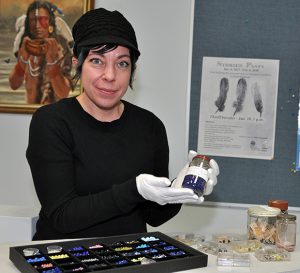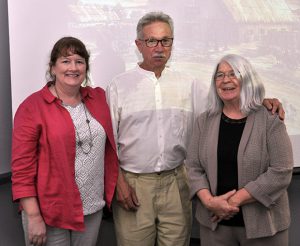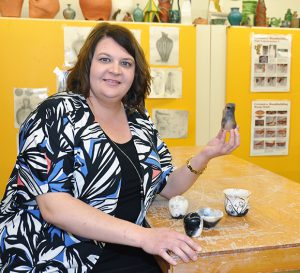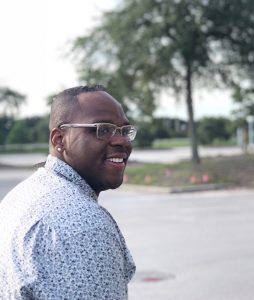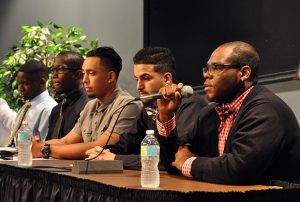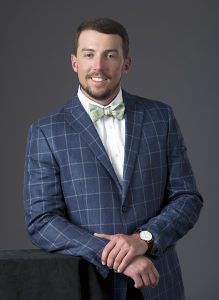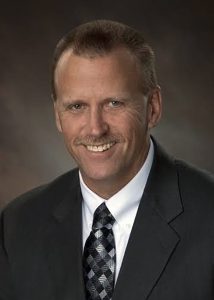A visit to the Museum of Florida Art and Culture (MOFAC) on the SFSC Highlands Campus in Avon Park will reveal a display of artifacts from the Goodnow Mound. Unearthed from the mound, which is located south of Sebring, are artifacts that date back as far as the 16th century and are attributed to Native Americans of Southwest Florida. Over 6,200 glass beads have been recovered from the site. These beads, in particular, sparked an intense curiosity in Megan Stepe, MOFAC curator.
But Stepe’s interest is part of a larger effort put forth by SFSC faculty. The brain child of Dr. Charlotte Pressler, professor of English and philosophy and director of SFSC’s Honors Program, “A Sense of Home: From Cultural Conflict to Coexistence in Florida’s Heartland” came into existence after she pursued a coveted National Endowment for the Humanities (NEH) grant. It is a three-year project focused on developing and enhancing local scholarship in Central Florida’s long history of cultural conflict and fusion. The $99,619 grant was awarded to SFSC in March 2016.
“The intention was to bring scholars on campus in a mini internal graduate seminar series for faculty and local high school teachers,” Dr. Pressler said. “Through this grant, we brought scholars to us, people who are recognized experts in their fields. After each of the seminars, we discussed the presentation material among ourselves and are incorporating modules into our current curriculum. These modules give students a taste of what their courses will be like at the university—analyzing, making connections, solving problems, applying concepts to new situations.”
Some of those scholars were Dr. Jerald T. Milanich, professor emeritus of the University Florida, who made presentations on the European invasion of Florida in the 16th century and Florida’s Spanish-Indian missions in the 16th through 18th centuries; Dr. Anna Lillios of the University of Central Florida who presented “Zora Neale Hurston and Eatonville”; and Dr. Mike Butler, professor of history at Flagler College, who presented “Confederate Imagery and Police Brutality: Racial Unrest and the Long Civil Rights Movement in One Florida Community.”
Pressler indicated that the grant focuses on Florida’s Heartland. “We live here; this is our home. Knowing that helps us understand how we got to where we are now and can give us inspiration for the future,” she said. “It can guide us and make us better citizens of Florida. We know that our students are coming to SFSC for job skills, we know that employers look to us for trained workers. Those economic and individual motivations are important in this world today. But there is a role for citizenship and community awareness as well. This is something the humanities can provide so that students going forward are better able to think about the meaning of what they’re doing.”
According to Dr. Pressler, Dr. Milanich is considered the world’s greatest expert on Florida’s indigenous people in the pre-contact and contact periods with Europeans. “Not many people realize that the Spanish had established a system of missions in Florida as they had in California,” she said. “Other new knowledge about that time period was the role that the epidemics—such as small pox and influenza—played in destroying Native American cultures. When cattle, hogs, and chickens were brought to North America by the Europeans, some of them escaped along with the influenza virus. Then, there was human-to-human transmission. In fact, the viruses crossed North America before the Europeans did.
“At SFSC, we have many students in the health care fields who are now grappling with the second wave of pandemics. Studying the earlier wave is critical to learning about new pandemics, such as Zika and AIDS.”
In Dr. Pressler’s Honors and regular English I courses, students are required to write research papers. “The research paper is practice for college research papers in other fields,” she said. “We’re not teaching content, but teaching skills. I’ve chosen to have students pick topics about Florida.”
In her presentation to the SFSC faculty as part of the NEH grant, Leslie Kemp Poole, a professor from Rollins College in Winter Park, Fla. and a former journalist, focused on the role that women and women’s clubs played in forwarding early conservation and environmental movements in Florida.
“I was able to translate Dr. Poole’s work into teaching English I students,” Dr. Pressler said. “Dr. Poole brought a reading list. I now can offer her book and other sources to my students. The grant provided money to buy books for the library so students can check them out. The grant also provided money to create library guides, or libguides, so they can do research. With these resources, I guide students while they work on their research papers.”
“It’s easy for survey courses to become too general,” said Dr. Theresa James, professor of English and humanities, who assisted in organizing the NEH lectures. “The textbook that we’re using in Introduction to Humanities is quite good but it’s a textbook that could easily be used in California or France or anywhere. Each of the NEH scholars brought some of their material home to our district. So, there’s no reason why we can’t offer that level of relevance to our students.”
In some of her classes, Dr. James has encouraged students to read the translated letters of a Jesuit missionary, Father Juan Rogel, who came to Florida in the 16th century to convert the native populations to Catholicism. “I made copies of those letters for the students to read. As an instructor, I may have to provide the students with a level of context such as ‘Read the magazine from the Florida Humanities Council. These particular issues of the magazine give you all the background you need to understand the context of the priest’s letters.’ So, a student who read that background and then looked at the priest’s letters, might be able to answer questions for extra credit. This takes a step out of the survey textbook and a look into specifics. Students can better see Father Rogel as that guy on the ground during the Age of Discovery.”
Michelle Macbeth is a professor of foreign languages and humanities. As a member of faculty, she has incorporated material from the scholarly NEH lectures into her own humanities class.
“The final NEH seminar covered the civil rights movement and the continuation of the movement,” Macbeth said. “In my Introduction to Humanities class, I sometimes have the students do conversation pieces, where we just talk about issues in class. Obviously, the stipulation is that ‘we’re going to be objective, we’re going to respect each other, and we’re going to be kind in the things we choose to say.’ We’ll have a conversation at the end of class about how things—such as the civil rights movement—affect our modern existence. If students don’t tie the material to their everyday lives or something that has a connection to their everyday lives, they don’t always see the buy-in for themselves. So through our humanities class, they can say ‘This is how we got here, this is why this is important now, this is why we’re talking about this, and this is why this is a part of our society.’”
In addition to her role as curator of MOFAC, Stepe teaches Art Appreciation. As a result of the NEH grant presentations, she saw the potential of introducing local history and culture into her class this fall.
“I have to admit that a lot of my education and training was focused on Europe,” she said. “In my class, we cover the Paleolithic period up until the present. We cover a lot of material, but it’s not in-depth material. We talk about ancient cultures either in other countries or other states, so incorporating aspects of NEH seminar material brings it to a more local level.”
“When Dr. Milanich discussed the early Spanish missions in Florida and ritual items that were used, such as rosaries, I connected that discussion with the beads in the Goudnow exhibit. I was looking at the Goudnow beads in terms of ritual but also in terms of trade goods and currency because the Native Americans working for the missions may have been paid in beads occasionally. They would either make things of beauty with them or something of a symbolic nature or trade them or give them as gifts.”
Stepe mentioned a man who visited MOFAC last year and showed a particular interest in the Goudnow beads. “He said that 25 years ago, he and a friend were tilling a field in the area. The sun was setting and hit the field in just the right spot. The whole field glittered with all of these beads—thousands of them.”
Stepe indicated that a special project for students associated with the NEH grant might be to bring in an archaeologist and have them do a talk about excavating various objects, such as beads and spearheads.
Karla Respress, art professor, plans to work with students in her pottery class on firing pottery in the ground instead of in a kiln. This method is sometimes called a pit fire. Instead of using the electric pottery kiln in the classroom, Repress and her class will take the pieces of pottery and slowly burn them on the surface or just below the surface of the ground with wood to harden the clay. “I felt it was do-able—we have the resources and the materials and prior knowledge of this technique. And this method of pottery firing is a natural fit with the NEH grant material.
“If we’re following the way the Native Floridians did it, you take broken pieces of pottery or rocks or even bricks and lift the places on the ground and put the pottery upside down on top of those just to create a kind of barrier between the pottery and the earth. Then you build a ring of pine cones or pine straw or grass or small sticks—fire starters—away from the pottery and then light it on fire. What that does is allow the pots to slowly get hot.
“You allow the fire to create the color of the pot. You can’t control the temperature like you do in a kiln. Clay will change color depending on how hot it gets, so one side of the pot will be a different color than the other side of the pot. You’ve got to allow it to do what the fire does to form the decoration of the piece, so we’re not sure what colors the pottery will be after the pit firing.”
The results of the NEH seminars may affect more than SFSC faculty and students. The faculty’s continuing exploration into Florida’s history and culture can extend into SFSC’s communities. When patrons visiting MOFAC learn that an artifact on display is from this region of Florida, they are often amazed. “People ask ‘This was found here?’” Stepe said. “I tell them ‘Yes, within a 30-mile radius of Avon Park.’”
“It’s my main goal for students to be excited, not only about learning about other kinds of art, but to be excited about where you’re at,” Stepe said. “Because there’s a treasure trove of things in this part of Florida, historically and archaeologically speaking, right here in our own backyard. I want members of our community to know about them.”
In high school, SFSC alumnus Ricky Sherrill, got the film bug. Now in his senior year at the University of Central Florida (UCF) in Orlando, he’s contemplating his future as a film editor and, possibly, director. He anticipates earning his Bachelor of Arts in Cinema Studies in spring 2019.
“Leading up to graduation in the spring, I’ve been stressing about it,” he said. “I’d like to work with a film company, to edit. Anything to do with editing, whether it’s for commercials or corporate videos. Eventually, I’d like to be a filmmaker and become one of the best. Right now, I’m most comfortable with editing.”
While a junior at Sebring High School, Sherrill took his first theater production class with teacher Jeff Cantwell. “At first, I thought it was going to be an easy A, just like a lot of other students. But I started taking it seriously when I discovered that I was good at editing film, directing, and being in front of the camera.”
Over time, Sherrill’s interest in making and editing films and videos soared and he put his enthusiasm to work. In 12th grade, he wrote a song for Sebring High School called “Blue and White.” A teacher then asked Sherrill to create a video for the school, one that would depict the school’s quality and the student’s school spirit.
Every filmmaker has been influenced by those who’ve gone before them, and Sherrill has a few favorites of his own. “I like all types of movies,” he said. “If I were to choose a favorite film director, I would say Quentin Tarantino. Recently, I watched ‘BlacKkKlansman’ by Spike Lee, which I really liked. I watched it by myself and absorbed it. But my favorite movie is ‘The Pursuit of Happyness’ with Will Smith. It had an impact on my life.”
“The Pursuit of Happyness” is about a single, homeless father who struggles to create a better life for himself and his son. Sherrill said that he lives by a quote from the film: “You got a dream. You gotta protect it. People can’t do somethin’ themselves, they wanna tell you you can’t do it. If you want somethin’, go get it.”
“In my own life, as much as I might want to quit, I just keep moving forward,” he said. “I try to see the bright side of things when things aren’t going my way. I was impressed by how determined the Will Smith character was in his life and how he lived. He was sleeping in bathrooms.”
“The quote from ‘The Pursuit of Happyness’ fits into my life right now,” Sherrill said. “When I graduated from SFSC in May 2016, I knew I wanted to go off to get my bachelor’s degree somewhere. My mom asked me how I was going to pay for it and where was I going to live. She wasn’t trying to discourage me; she was, simply, being practical. I honestly had no idea how I would pay for things. I knew at the end of the day that I wanted to go away to college. I didn’t let anything stop me from pursuing that dream.”
But Sherrill worked through the challenges. His mother helped him find a place to live in Orlando, and a first generation scholarship to UCF covered tuition in his junior year. In Sebring, Sherrill had worked at Publix and continued to do so while in Orlando. “During the spring and fall, I work 20-25 hours a week. During the summer, it’s 30-35 hours a week. I receive financial aid to pay for tuition, but I have to pay for rent as well. Every wall between me and going to college, I knocked it down. Don’t ever let anyone tell you that you can’t do something.”
Sherrill has been able to share his experiences in life and college. At the urging of SFSC student advisor Rob Hampton, Sherrill served as a panel member for SFSC’s Minority Male Initiative for three years. Every spring, SFSC invites nearly 100 minority male students from high schools in Highlands, Hardee, and DeSoto counties to its Highlands Campus. The intention of the half-day conference is to motivate young men to enroll in college credit and occupational certificate programs after completing high school and know that they will find a supportive and nurturing college experience that will prepare them for the future.
“I’ve been in their shoes,” Sherrill said. “This past year, I felt like the students were interested to know why they should keep going. After I made a brief presentation, I found that one student in the audience was on the same path that I was on. He was interested in pursuing an education in film. He wanted to know how to pay for it, what classes I was taking.
“Being on the panel motivated me even more in continuing my education because I was picked to do something like that. I encouraged others and that inspired me to work even harder in pursuing my education. In other words, I have the power to have a voice in this, I get to hear others’ stories, so it motivated me.”
“Ricky has been a part of the Minority Male Initiative since its launch in 2016,” Hampton said. “He has never hesitated to volunteer his time and life experiences, in hopes of inspiring young men in our community.”
Although Sherrill has several months to go before earning his bachelor’s degree, his future is at the forefront of his mind. “At first, I considered going to Los Angeles for work. But what changed my mind was the fact that a speaker who came to my film class stated there are other opportunities elsewhere. So, my goal is to work for Publix Corporate in Lakeland, then possibly go into the filmmaking world later on in life.”
Sherrill offers advice to people contemplating college: “If you don’t put the action in it, if you don’t believe in yourself, you won’t accomplish your dream. If you don’t know how, how can you expect someone else to believe in you? I want everyone to succeed. If you’ve got something you want to do, the road may not be easy, but there’s a light at the end of the tunnel. You’ve got to go through the darkness to get to the light.”
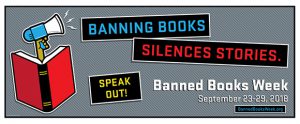 What do the Harry Potter books, “To Kill a Mocking Bird,” and “Thirteen Reasons Why” have in common? At some point, each one has been challenged or banned in libraries or schools. Banned Books Week, an annual celebration sponsored by the American Library Association, helps raise awareness of efforts to ban books and highlights our freedom to read. The South Florida State College (SFSC) Library celebrates Banned Books Week Monday, Sept. 24–Friday, Sept. 28.
What do the Harry Potter books, “To Kill a Mocking Bird,” and “Thirteen Reasons Why” have in common? At some point, each one has been challenged or banned in libraries or schools. Banned Books Week, an annual celebration sponsored by the American Library Association, helps raise awareness of efforts to ban books and highlights our freedom to read. The South Florida State College (SFSC) Library celebrates Banned Books Week Monday, Sept. 24–Friday, Sept. 28.
Since its inception in 1982, Banned Books Week has reminded us that while not every book is intended for every reader, each of us has the right to decide for ourselves what to read, listen to or view. SFSC Library and thousands of colleges, schools, libraries and bookstores across the country will celebrate the freedom to read by participating in special events, exhibits, and read-outs that showcase books that have been banned or threatened. The SFSC Library hosts a week-long celebration featuring displays, activities, and banned book mystery dating. The Banned Book Mystery Dating allows anyone to check out an unknown book in a plain brown wrapper for a surprising read. Through a partnership with the Heartland Library Cooperative, public library card holders in good standing may check out SFSC Library books year round.
Thanks to the commitment of librarians, teachers, parents, and students, most challenges are unsuccessful, and reading materials like “I Know Why the Caged Bird Sings,” “Slaughterhouse Five,” the Harry Potter series, and the Hunger Games series remain available.
The most challenged and/or restricted reading materials have been books for children. However, challenges are not simply an expression of a point of view; on the contrary, they are an attempt to remove materials from public use, thereby restricting the access of others. Even if the motivation to ban or challenge a book is well intentioned, the outcome is detrimental. Censorship denies our freedom as individuals to choose and think for ourselves. For children, decisions about what books to read should be made by the people who know them best—their parents.
Since 1990, the American Library Association’s (ALA) Office for Intellectual Freedom (OIF) has recorded more than 10,000 book challenges, including 354 in 2017. A challenge is a formal, written complaint requesting a book be removed from library shelves or school curriculum. About half of all challenges are to material in schools or school libraries, and one in four are to material in public libraries. OIF estimates that less than one quarter of challenges are reported and recorded.
The SFSC Library is located on the Highlands Campus, in Building Y, 600 W. College Dr., Avon Park, and is open Monday through Thursday, 7:30 a.m.–9 p.m., and on Friday, 7:30 a.m.–5 p.m. For more information, visit southflorida.edu/library or contact Claire Miller, SFSC librarian, at MillerC@southflorida.edu or 863-784-7305.
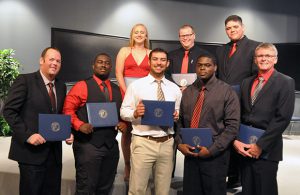
Graduates (from left, front): Nicholas Arnold, Romeo Dunn, Jacob Figur, Deandre Marshall, and Greg Carr; (left, back) Elizabeth DeBree, Cord Rich, and Jacob Servin
SFSC graduated eight students from its Firefighter Minimum Standards program during the Wednesday, Sept. 13 ceremony at the Highlands Campus in Avon Park. All eight students passed the state certification examination with the Bureau of Fire Standards and Training to become certified firefighters in Florida.
Receiving their certificates were Nicholas K. Arnold, Gregory M. Carr, Elizabeth M. DeBree, Romeowanya L. Dunn, Jacob A. Figur, Deandre L. Marshall, Cord D. Rich, and Jacob A. Servin.
Guest speaker Assistant Chief Robert Weech of Polk County Fire Rescue addressed the graduates. “Tonight’s a big night, and you should be congratulating yourself and you should celebrate. But realize this is just a first step in a long, long journey. As you progress in your careers, find balance in life. Obviously, you’re going to strive to be the best firefighter and public service agent that you can be. Also, commit to being the best father, the best mother, the best husband or wife you can be. When you achieve that balance, it will be well worth your while as you move forward in your career.”
Weech indicated that while hiring at Polk County Fire Rescue, he looks for four qualities in a candidate and asked the graduates to uphold them. “Don’t be afraid to get out there and get your hands dirty and continue to learn new things,” he said. “Make sure your hard work directly correlates to results. Be someone who handles frustration well. I assure you, we don’t always have good days. But the next call deserves that we’re doing our best. So work at being well and a person who deals with frustration well. Also, strive to be a dedicated public service agent. Remember what you’re there to do at all times—serve the public.”
Four students were recognized for special achievement. They were Jacob Servin for Most Heart, Greg Carr for Most Improved, Nicholas Arnold for Team Player/People’s Leader, and Cord Rich, Most Valuable.
The Firefighter Minimum Standards occupational certificate program is for applicants who want to pursue a career in fire service but have limited fire training and experience. A cohort of cadets enroll in the Firefighter I course, often with the expectation of continuing through to Firefighter II training. Minimum Standards training is required for volunteer firefighters. Firefighter II training is required for those who wish to be employed as professional firefighters in Florida.
For more information about the SFSC Fire Science Program, contact the SFSC Advising and Counseling Center at 863-784-7131.
The SFSC Library joins in the celebration of International Talk Like a Pirate Day on Wednesday, Sept. 19, 8 a.m.-9 p.m., with door prizes, activities, and features a stuffed parrot.
“Last year, Hurricane Irma came and canceled our celebration,” said Lena Phelps, head librarian. “I’ve had everything ready to go in my office for a year, waiting.” Phelps has celebrated the holiday for several years with an assortment of activities and prizes for attendees.
International Talk Like a Pirate Day was started on a whim by John Baur and Mark Summers. The two men discovered that talking like stereotypical pirates during a poorly played game of racquetball made everything more fun. They decided to celebrate the holiday annually on Sept. 19. The holiday gained wider recognition when the Miami Herald’s Dave Barry wrote about it in his column. Baur and Summers had emailed Barry and encouraged him to highlight the holiday that they had created. The column was published in 2002, and Talk Like a Pirate Day has been celebrated internationally ever since.
SFSC Library’s celebration will be held in Building Y, on the SFSC Highlands Campus, Avon Park. Costumes are welcome.
For more information on the SFSC Library’s celebration, contact Claire Miller, SFSC librarian, at millerc@southflorida.edu or 784-7305.
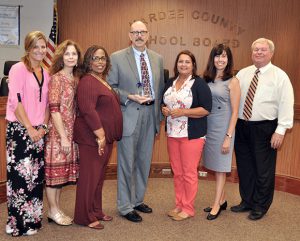
(from left) Leigh Beumel, guidance counselor; Kim Davis, guidance counselor; Teresa White, guidance counselor; Jerry Donna; Teresa Crawford, Hardee County School Board member and director of the SFSC Hardee Campus; Dr. Michele Polk, Hardee Senior High School principal; and Bob Shayman, superintendent of the Hardee County School District
Jerry Donna, SFSC director of financial aid, was recognized recently by the Hardee County School Board for assisting high school guidance counselors increase the number of high school seniors who complete the Free Application for Federal Student Aid (FAFSA). Donna attended FAFSA Night at Hardee Senior High School and helped answer students’ and parents’ questions about information required on the FAFSA form.
In April 2018, the Florida College Access Network (FCAN) announced the winners of the 2018 Florida FAFSA Challenge. According to FCAN, the challenge is a statewide campaign to increase the proportion of high school seniors completing the FAFSA. Of the small school districts in Florida, Hardee County was deemed “Most Improved,” meaning that the Hardee County School District improved its FAFSA completion rate the most compared to the previous year.
“We have made a concerted effort in the last couple of years to encourage our senior students to complete the FAFSA form, which is money that becomes available for their education after high school,” said Dr. Michele Polk, Hardee Senior High School principal. “And these ladies from our guidance department have really been the ones to champion the effort. But they haven’t done it alone. We’ve had some help particularly from an individual at South Florida State College—Mr. Jerry Donna.”
“We have a dream of having more kids go to college, and so we called you, Jerry,” said Kim Davis, Hardee Senior High School guidance counselor. “You didn’t know us, and we didn’t know you, but you graciously came over [to Hardee Senior High School] and made our program great.
“Our kids and our parents love you. You answered all the complicated questions that we can’t answer. You made it such an easy process. Our students walk out of the media center getting $4,000 and $5,000 in Pell Grant money. We just want to thank you, Jerry, for everything you do for our kids.”
The SFSC Library will celebrate Batman Day on Friday, Sept. 14, 8 a.m.-5 p.m., on the Highlands Campus, Avon Park.
The annual celebration of the iconic superhero and all things Gotham will feature graphic novels, games, crafts, and a Gotham-themed photo booth. Batman Day is a yearly event organized by DC Comics, and the SFSC Library has participated for the last three years.
“Batman Day is a great unifier,” said Claire A. Miller, SFSC librarian and event coordinator. “Whether you read the comic books, watched the cartoons, or saw the latest blockbuster movie, Batman, Robin, and the rest of Gotham are fun to be excited about.”
The SFSC library’s preparations this year include craft projects, a photo booth, and a brand new component: an interactive game where you can play Batman trying to solve a mystery in Gotham.
“It’s sort of an analog choose-your-own-adventure game with physical clues,” Miller said. “You get to play Batman, and, if you can solve the mystery, you get a prize. Because everyone wants to be Batman for a little while.”
The SFSC Library is on the second floor of Building Y on the Highlands Campus.
For more information, contact Miller at millerc@southflorida.edu or 863-784-7305.
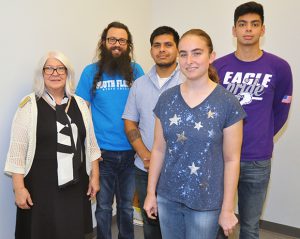
(from left) Dr. Charlotte Pressler with Honors students Nicholas Fischer, Lisandro Hernandez, Cambrie Landress, and Anthony Zepeda
SFSC awarded eight students in its Honors Program the Edward K. Roberts Book Scholarship, an award that helps students cover the cost of textbooks. The students include: Nicholas Fischer, Lisandro Hernandez, Cambrie Landress, Jami Mercer, Leticia Jauregui, Robert (“Bobby”) Brown, Peyton Roberts, and Anthony Zepeda.
Students awarded the merit-based scholarship receive $250 in the form of a credit they can use toward the purchase of textbooks at SFSC’s Campus Store.
SFSC’s Honors Program offers students cultural enrichment, smaller classes, scholarship opportunities, and special recognition at the Commencement ceremony as well as an honors endorsement on their Associate in Arts degree and transcript. Honors students also take part in a service-learning project in the community.
Students receiving the scholarship must enroll in one honors course during the academic term in which they receive the scholarship. Returning students must achieve a 3.3 cumulative college GPA and continue to make satisfactory progress toward the Honors Program Associate in Arts degree.
“I am very proud of these honors students, whose commitment to excellence has earned them this book scholarship,” said Dr. Charlotte Pressler, SFSC Honors Program director and professor of English and philosophy. Dr. Pressler also expressed pride in the students’ aspirations for the future. “In the Honors Program, I have two future pharmacists, three future engineers (mechanical, civil, and unmanned aerial systems), and one future attorney.”
For more information, contact Dr. Pressler at 863-784-7247.
Sept. 6, 2018 – South Florida State College (SFSC) is offering a nine-hour class on using computer-aided design and 3-D printing to create custom products—and it’s free.
“Introduction to CAD and 3-D Printing” will meet on Oct. 8, 10 and 22 from 5:30 to 8:30 p.m. in the Center for Advanced Technology at the SFSC Highlands Campus. The class will show how you can use Autodesk Inventor to create basic 3-D models, convert those models to 3-D printer files using MakerBot Print software, and combine models to form assemblies.
Autodesk Inventor is industry-standard software used for creating three-dimensional prototypes and their mechanical specifications in a digital format. MakerBot Print is free software that optimizes and streamlines the 3-D printing process.
Register for the class by calling 863-784-7238. Space is limited to 24 participants.
SFSC also offers training programs in engineering technology, mechatronics, automation, computer numeric controlled (CNC) machinist/fabricator, lean manufacturing and pneumatics, hydraulics, and motors for manufacturing. To learn more, call 863-784-7401.
Alex Fells and Darrell L. Jensen were recently elected to serve on the SFSC Foundation Board of Directors for a three-year term.
“We are thrilled that Darrell and Alex have made the decision to join the SFSC Foundation Board of Directors,” said Jamie Bateman, executive director of institutional advancement at SFSC. “Both of these gentlemen are assets to our community, and we are fortunate they made the decision to join our board.
“We sincerely appreciate all of the hard work and dedication our Foundation board members do for SFSC on a daily basis. Our dedicated group continuously looks for ways to help advance the College and works with our community to create awareness and support.”
Representing Highlands County, Fells is the vice president of asset management for Legacy Communities, based in Sebring. Fells previously was founder and president of Florida Heritage Apparel. While in high school, he was a student in SFSC’s Dual Enrollment Program and went on to receive his Bachelor of Science in Diversified Agriculture from Abraham Baldwin Agricultural College in Tifton, Ga.
As a Foundation board member, Fells follows in the footsteps of his mother, Tami Cullens, who served on the board, 1997–2018, and his grandmother Eileen Sachsenmaier, a charter member of the board who served 1984–87.
“I joined the Foundation to continue my family’s legacy with SFSC,” Fells said. “It is also time for me personally to start giving back to the community, and I could not think of a better place to start.”
Darrell Jensen, CPA, who also represents Highlands County, is the chief financial officer of Heacock Insurance Group in Sebring. He received his Associate in Arts degree from SFSC in 1991 after serving in the U.S. Air Force. He went on to earn his Bachelor of Science degree in accounting from Webber International University and an M.B.A. with a concentration in accounting from Florida Southern College. Jensen also serves on the MidFlorida Credit Union Board of Directors.
“I am honored to serve on the SFSC Foundation board, supporting the College that helped me many years ago,” Jensen said. “I began college classes at SFSC and went on to pursue my bachelor’s and master’s degrees. This enabled me to become a CPA and have a successful career here in Highlands County. I would like to see everyone have the opportunity to pursue their educational goals and be able to prepare for a career in their chosen field.”
The SFSC Foundation is the official fundraising and gift-receiving organization for SFSC. As a nonprofit corporation, it works with local business partners and friends to establish scholarships, fund endowments, and offset capital expenditures. To make a donation to the SFSC Foundation, call 863-453-3133 or email foundation@southflorida.edu.

